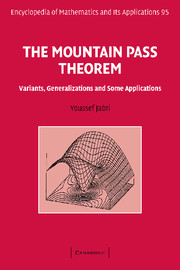Book contents
- Frontmatter
- Contents
- Introduction
- 1 Retrospective
- I First Steps Toward the Mountains
- II Reaching the Mountain Pass Through Easy Climbs
- III A Deeper Insight in Mountains Topology
- IV The Landscape Becoming Less Smooth
- V Speculating about the Mountain Pass Geometry
- VI Technical Climbs
- A Background Material
- Bibliography
- Index
Introduction
Published online by Cambridge University Press: 04 September 2009
- Frontmatter
- Contents
- Introduction
- 1 Retrospective
- I First Steps Toward the Mountains
- II Reaching the Mountain Pass Through Easy Climbs
- III A Deeper Insight in Mountains Topology
- IV The Landscape Becoming Less Smooth
- V Speculating about the Mountain Pass Geometry
- VI Technical Climbs
- A Background Material
- Bibliography
- Index
Summary
The methods we will take up here are all variations on a basic result known to everyone who has done any walk in the hills: the mountain pass lemma.
L. Nirenberg, Variational and topological methods in nonlinear problems, Bull. Am. Math. Soc., 4, 1981Why a Book on the Mountain Pass Theorem?
The mountain pass theorem (henceforth abbreviated as MPT) is a “phenomenal result” that marks the beginning of a new approach to critical point theory. It constitutes a particularly interesting model for the abstract minimax principle known since the pioneering work of Ljusternik and Schnirelman in the 1940s. It is also the grandfather and the prototype of all the “postmodern” critical point results from the linking family. As early as it appeared, it attracted attention by raising up a lot of theoretical development and serving to solve a very large number of problems in many areas of nonlinear analysis.
The MPT has been intensively investigated. Indeed, there is actually a huge amount of references specifically devoted to its study or presenting one of its variants, generalizations, or applications. Its influence can be measured by the fact that you will rarely find a recent paper or book dealing with variational methods that do not cite it.
- Type
- Chapter
- Information
- The Mountain Pass TheoremVariants, Generalizations and Some Applications, pp. 1 - 6Publisher: Cambridge University PressPrint publication year: 2003
- 1
- Cited by

